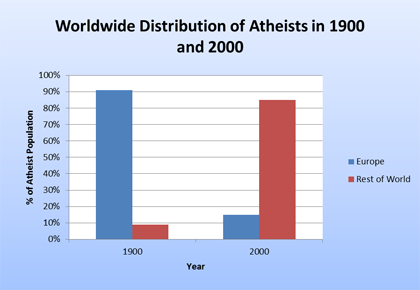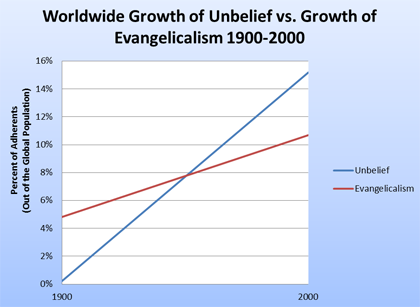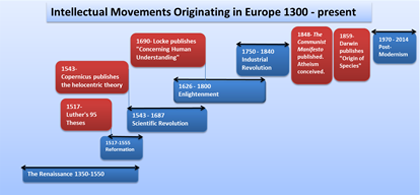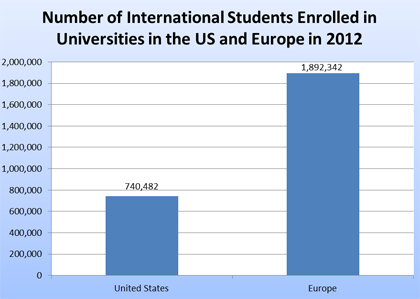One of the greatest global fears in the last 10 years has been that some form of avian (bird) flu might spreadaround the world and infect untold millions. In fact, this has already occurred spiritually: the Developing World has already caught the deadly European spiritual virus of...
 Photo: Toby Fruge (Flickr)
Photo: Toby Fruge (Flickr)
One of the greatest global fears in the last 10 years has been that some form of avian (bird) flu might spread around the world and infect untold millions. In fact, this has already occurred spiritually: the Developing World has already caught the deadly European spiritual virus of unbelief.
Let me explain. Evangelicalism is often described as the most dynamic and fastest-growing religious movement in the Developing World. Others would say the same of Islam. However, neither is.
Unbelief (atheism and agnosticism) is the fastest-growing religion in the 20th century. In 1900, atheism had approximately 225,000 adherents worldwide, and 90 percent of them lived in Europe. By 2000, this small group had grown to more than 150 million worldwide– but only 18 percent of these unbelievers live in Europe. The following graphs show atheism’s growth over the last 100 years. This is extraordinary. Atheism, which was born as a European belief system, has now become a global movement where the vast majority of its adherents are outside of Europe.
 Figure 1.
Figure 1.These atheists influence a much larger group of agnostics toward unbelief. In 1900 there were approximately three million agnostics in the world and by 2000 there were more than 750 million.
According to the World Christian Encyclopedia:
“Two immense quasi-religious systems have emerged at the expense of the world religions: agnosticism and atheism. From a minuscule presence in 1900, a mere 0.2% of the globe, these systems have mushroomed.... They are today increasing at the extraordinary rate of 8.5 million new converts each year, and are likely to reach one billion adherents soon.”
For atheism and agnosticism to grow from 0.2% of the globe to over 15% is a significant increase. It is alarming to compare unbelief’s explosive overall growth with that of Evangelicalism. As the graph below indicates, Evangelicalism only grew from 4.8% to 10.7% of the world’s population over the same time period.
 Figure 2.
Figure 2.Unbelief started as a uniquely European idea, but has now become a worldwide tsunami.
Why has Europe been so effective in communicating this pandemic of unbelief to the rest of the world?
1. Europe has powerfully influenced the world over the last 500 years.
For the last 500 years, most of the world’s leading movements came out of Europe. The Renaissance, Reformation, Enlightenment, Scientific Revolution, Industrial Revolution, Higher Education (the university and all the new academic disciplines), Marxism, Nazism and Post-modernism all have their roots in Europe. These have dominated modern cultures, caused worldwide wars, framed ideologies for countries controlling hundreds of millions of individuals, and shaped generations of leaders. If the church is going to understand and know how to respond appropriately to these and other new movements emerging from Europe, we need to invest our time and energy in understanding them in Europe itself. This is especially true because many of these movements are not neutral in their response to the Gospel.
 Figure 3.
Figure 3.[See full quality graph here]
To effectively communicate the Gospel to those who have been influenced by these movements, we need to understand them and find ways to show them the Gospel’s truth and relevance.
2. Europe is the leading educator of the rest of the world.
Europe is not only the origin of the world’s most dominant ideas, but it is also the leading educator of the world’s leaders. Over twice as many international students are being educated in Europe as in the U.S.
 Figure 4.
Figure 4.Even leading American universities are actually European universities with an American accent. The disciplines studied at American universities were created by Europeans. Each of these disciplines represents a set of lenses to see the world. These intellectual centers are carriers of the disease of unbelief mentioned above. One of the strongest outposts of European unbelief in America, and increasingly in the Developing World, is the university, as it is shaping students in its own image.
The ultimate status symbol in the Developing World is a degree from a premier Western university. A friend who recently travelled across Africa was struck by how often those in the most influential leadership positions have such prestigious western degrees. He then commented, “When a PhD from Cambridge speaks in Africa, the room gets quiet.” The ladder to success in the Developing World is education, and the means to such status is a prestigious degree. Europe’s influence in the Developing World is growing because of the influx of European- educated leaders.
Europe is the place where the global battle for the Gospel is being fought.
The Gospel’s most dangerous opponent is not Islam, Hinduism or Buddhism. The greatest challenge to orthodox belief is the European unbelief (atheism & agnosticism) that is growing much faster than Evangelical faith. If the church in Europe, and indeed the world, is to be helped, antidotes to Europe’s unbelief must be found in Europe and dispersed around the world. Leaders from around the world must be equipped and mentored in order to understand and dismantle these modern objections to the Gospel. In other words, evangelicals need to focus on Europe as the central battleground on which to combat this problem and to train the next generation of global Evangelical leaders.
What happens when the U.S. Centers for Disease Control (CDC) determines that a dangerous virus has an outbreak somewhere in the world? The CDC immediately flies its team of investigators and scientists to that site in order to isolate the earliest possible form of the virus and determine how to defeat it. In other words, the CDC doesn’t just wait to begin treatment at the borders of the U.S.; it goes to the disease-ridden area and tries to find a cure there. Once the treatment is effective there, various immunization initiatives can be transplanted locally, regionally and internationally.
Similarly, a cure needs to be found in Europe for unbelief on that continent, rather than delaying a response until it has already infected a new area.
Imagine walking into a doctor’s office and, before he examines you or runs any tests, he immediately says, “You need brain surgery. Lie down on this table and let me get my drill.” Obviously, before a doctor can prescribe, he needs to carefully diagnose. The same is true in the spiritual realm. The first step to solving any problem is to realize that you have a problem and to understand it.
In our first post, we talked about the bird’s eye view of what’s happening in the world (we saw we have a problem), and this week we see how Europe is strategically important (we understand the source of the problem more clearly). Next week, we will go beyond what is happening to understand why this has happened and how it affects Evangelicalism in the Developing World today.
* All statistics regarding the Evangelical church and unbelief are taken from the World Christian Encyclopedia, Volume 1, (Ed. David B. Barrett).
Statistics regarding international students are taken from UNESCO Institute for Statistics. http://www.uis.unesco.org/Education/Pages/international-student-flow-viz.aspx
Greg Pritchard earned his MA from Trinity School of Divinity before continuing on to finish his PhD at Northwestern University. The intersection of theology, history, philosophy and sociology is Greg’s primary focus both in teaching and writing. He has taught graduate-level courses on apologetics, theology, history, leadership, the New Testament, ethics, and Christian Thought at American, European, and Asian institutions of higher learning. His book, Willow Creek Seeker Services, has been published in four languages. In addition, Greg has worked as the COO at a Chicago investment firm. Currently, he serves as the President of the Forum of Christian Leaders and as the Director of the European Leadership Forum.
The Forum of Christian Leaders (FOCL) is the sponsor of the European Leadership Forum (ELF), which seeks to unite, mentor, and resource European evangelical leaders to renew the biblical church and re-evangelise Europe. This happens first at the ELF's annual meeting that occurs each May in Poland. In addition to the ELF, FOCL is host to an online media library and learning community for evangelical Christians. Learn more at foclonline.org and euroleadership.org; or join us on Twitter @FOCLonline and Facebook Forum of Christian Leaders.

Las opiniones vertidas por nuestros colaboradores se realizan a nivel personal, pudiendo coincidir o no con la postura de la dirección de Protestante Digital.
Si quieres comentar o